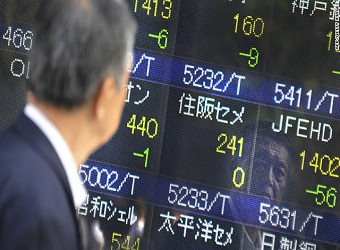Asian markets were mostly lower on Tuesday, as pussyfoot investors look to the Federal Reserve chair’s two-day congressional testimony starting Tuesday for her comments on banking regulations and potential hints of the Fed’s rate hike trajectory.
At Janet Yellen semiannual testimony to Washington’s lawmakers, she is expected to face a barrage of questions on what role she believes the Fed will play as banks face a very different post-financial crisis world under Trump’s administration, as the new U.S. president pushes for financial deregulation.
“Markets are anticipating a reaffirmation of the Fed’s stance for a gradual pace of rate normalisation, expecting Yellen to adopt a wait-and-see stance on new fiscal policy changes from Trump given the lack of clarity for now,” said Chang Wei Liang, economist at Mizuho Bank, in a Tuesday note.
Chang added that there is the risk of Yellen warning of the need for tighter monetary policy, in the event that Trump’s financial stimulus brings about heightened price pressures in an economy with a tight labor market.
Down Under, the ASX 200 was up 0.11 percent, after a National Australia Bank’s January survey showed its index of business conditions were at highs last seen in the middle of 2007, as firms reported a pick up in sales and steadier profits.
Major Australian miners were mixed by early afternoon, with Rio Tinto up 0.89 percent, Fortescue Metals adding 1.6 percent, while BHP BIlliton slipped 0.28 percent.
Copper prices hit its highest levels since May 2015 overnight on limited supply after strikes at BHP Billiton’s Escondida and Freeport McMoran’s Indonesian Grasberg mine, Reuters reported.
Mainland Chinese shares were somewhat flat, as investors digested news that China’s consumer prices rose 2.5 percent in January on-year, its highest since May 2014.
China’s producer price index also grew at 6.9 percent, the quickest pace since August 2011.
The Shanghai composite was down 0.14 percent and Shenzhen composite was 0.106 percent higher.
Hong Kong’s Hang Seng index was down 0.01 percent.
Japan’s Nikkei 225 fell 0.35 percent, as Japanese Finance Minister Tao Aso said that it may take some time for both Tokyo and Washington to set up a framework for bilateral economic dialogue.
Toshiba shares fell seven percent, and was earlier untraded due to a glut of sell orders, after the company said it can’t say when the October to December quarter earnings report will be released.
The Nikkei business daily had also reported that the Japanese conglomerate may not be able to continue as a going concern, following massive nuclear-related losses.
South Korea’s Kospi fell 0.36 percent, as the political scandal, involving the impeached President Park Geun-hye dragged on.
Samsung heir Jay Y. Lee emerged from the South Korean special prosecutor office early Tuesday morning, after being questioned nearly the whole of Monday for his alleged role in a corruption scandal.
The Dow Jones industrial average posted its 22nd record close since November 8, up 0.7 percent at 20,412.16; the S&P 500 added 0.52 percent to close at 5,763.96, its 14th record close and also hit $20 trillion in market cap for the first time.
The Nasdaq composite advanced 0.52 percent to finish at 5,763.96, led by Apple, which closed at an all-time high on Monday at $133.29.
“The focus remains on U.S. equity markets, with the S&P 500 grinding higher yet again amid solid gains in financials, tech and industrial names,” said Chris Weston, chief market strategist at IG, in a Tuesday note.
Weston added that the rally may reverse once further details of the phenomenal tax plan are released.
In corporate news, China’s state-owned Sinochem is in early talks with Noble Group to buy an equity stake in the troubled Singapore commodities trader, Reuters reported late on Monday. Shares of Noble Group soared 14.21 percent on Tuesday morning.
Oversea-Chinese Banking Corp. (OCBC), Singapore’s second largest listed bank, said net interest income fell seven percent in the fourth quarter of 2016 to S$1.25 billion with net allowances for loans and other assets of S$305 million, a jump of 57 percent above S$193 million in the same quarter a year earlier.
The bank said it continued to see loan quality stresses, particularly within the oil & gas sector which drove increases in non-performing loans and allowances with an uncertain outlook and depressed oil prices particularly impacted oil and gas support services sector.
The dollar slipped from its three-week high below the 111 handle, to trade at 100.94 against a currency basket during Asian trade.
Against the greenback, the yen slipped to 113.62 at 11:55 a.m. HK/SIN, weaker compared to last week’s low around 111. The Australian dollar was steady at $0.7668.
During Asian trade, Brent crude futures recovered from the overnight 2 percent drop, to trade up 0.25 percent at $53.06 a barrel, while U.S. crude added 0.23 percent at $53.06.
On Monday during U.S. hours, crude oil prices tumbled by around 2 percent on the stronger dollar and indications of rising U.S. shale output, Reuters reported.
Source: CNBC


